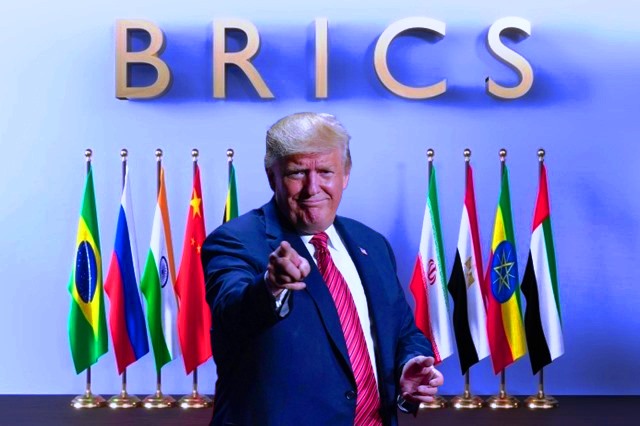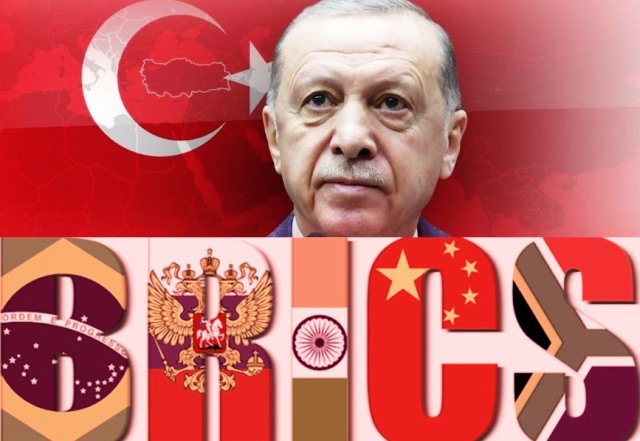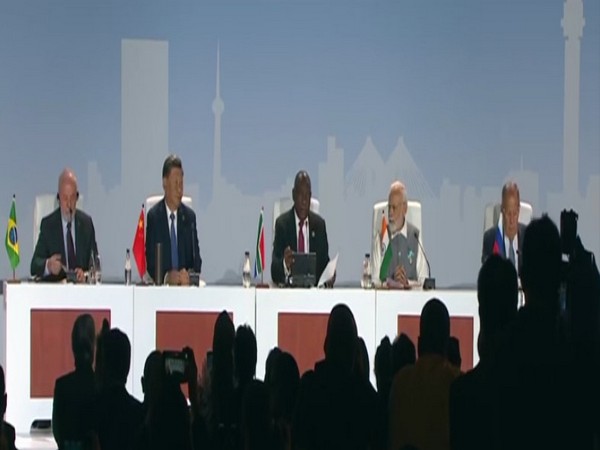US President Donald Trump on July 18 mocked the BRICS bloc as a “little group” that is “fading out fast” and reiterated his warning of a 10 percent tariff on countries aligning with it, accusing them of supporting “anti-American policies”.
Trump further took credit for undermining the bloc’s attempts to challenge the global dominance of the US dollar, vowing that he would never let that happen.
Donald Trump, taking firm stance toward global economic competitors, said, “When I heard about this group of six countries in BRICS, I hit them very hard, and if they ever really form in a meaningful way, it will end very quickly.” Though he didn’t name the nations, Trump added, “We can never let anyone play games with the US.” He also stressed the importance of maintaining the US Dollar’s global reserve status. “We are not going to let the Dollar slide… If we lost the status of the Dollar as the world’s reserve currency, it would be like losing a World War,” Trump said.
Trump had targeted Brazil with new trade penalties, announcing a 50 percent tariff on imports beginning in August over what he described as “unfair” trade practices. This follows his earlier July 6 declaration of a 10 percent tariff on any nation aligning with the BRICS group.
BRICS Over the Years
The BRICS group, originally formed in 2009, is a coalition of emerging economies comprising Brazil, Russia, India, China, and South Africa (which joined in 2010). In 2024-25, the bloc expanded to include Egypt, Ethiopia, Indonesia, Iran, Saudi Arabia, and the United Arab Emirates, bringing the total number of member countries to 11.
BRICS was established with the goal of promoting peace, development, and a more balanced global order by strengthening economic cooperation among developing nations. Over the years, it has positioned itself as a counterweight to Western-led institutions like the G7 and the IMF, advocating for a multipolar world and reforms in global governance systems. The bloc also promotes the use of local currencies in trade.
But what defines BRICS today is a subtler, more strategic ambition: to insulate themselves from Washington’s gravitational pull while cooperating to build a joint hi-tech industrial base. There are things that the BRICS get right. Financial global institutions such as the International Monetary Fund are in need of reform; the rich world has failed to honour climate finance promises. The group’s understandable response in the face of inaction is to create its own development bank to promote a form of green industrialisation.
Yet, its size hides its contradictions. The grouping’s call for more inclusive global institutions sounds welcome, but there is a preponderance of autocracies within its own ranks. BRICS is right that international law should be upheld in Middle Eastern conflicts. But it climbs down from its moral pedestal by condemning Ukraine’s strikes on Russian infrastructure – while staying silent on Moscow’s relentless attacks on civilians.
Rio Summit and a new global currency
The BRICS summit in Brazil last week revealed a loose alliance of emerging powers becoming more complex – and perhaps more consequential. But the most important issue on how to replace the dollar globally, was pushed under the carpet, perhaps due to the direct threats by Trump. Though the de-dollarisation rhetoric serves more as a signal of intent than an imminent threat to dollar hegemony.
A Guardian editorial on the latest BRICS summit opined that the, “BRICS nations can still close ranks. Their most technical yet revealing move is to start building financial “plumbing” to bypass western systems. The group is not ditching the dollar – but its members know what exclusion feels like: India had credit denied after the 2008 crash; Iranian banks have been sanctioned since 2012. The bloc’s success will depend not just on ambition, but on the capacity to coordinate across national interests.” This seems rather an uphill task, as individual interests might overcome the greater collective benefit.
Sarang Shidore, Director, Global South Program, Quincy Institute for Responsible Statecraft, Washington DC, US in a letter to the Financial Times opined that, “The rise of BRICS provides an important multilateral corrective in a world dominated by the US for the past three decades but now transitioning away from both unipolarity and multilateralism. Such a corrective will inevitably come with its own flaws and blind spots. But a stable transition requires it.”
Dr Diego Maiorano, a Visiting Research Fellow at the Institute of South Asian Studies (ISAS), an autonomous research institute at the National University of Singapore (NUS), commenting on the new BRICS currency opined that in fact, the drive by BRICS+ to de-dollarise international trade remains at an embryonic stage. Most cross-border transactions among the BRICS members are still settled in US dollars, and attempts to build alternatives (such as the BRICS Cross-Border Payment System) are nascent and far from supplanting established mechanisms like the SWIFT, even though they are useful tools for countries (such as Russia and Iran) hit by sanctions.
Christopher Phillips, Professor of International Relations at Queen Mary University of London, in his article in the Arab News opined that Russia and China were among the most supportive of a new BRICS currency to challenge the dollar in Kazan. But on the eve of the Rio de Janeiro summit, Trump’s threats contributed to reluctance among other BRICS members, especially India, which fears Chinese dominance of the new currency, to advance the proposal. No major headway was made on the issue and the final joint statement even contained references to the global importance of the dollar — perhaps an effort by some to appease Trump.
Overall, the future of BRICS might be shaped less by external threats and more by its ability to reconcile internal contradictions and articulate a coherent vision for global governance. For now, the coalition is more a reflection of the shifting geopolitics of the Global South than a monolithic challenger to the West. The embryonic nature of its de-dollarisation efforts and the moderating influence of India and Brazil suggest that the group’s challenge is more latent than explicit. Nevertheless, as Western institutions continue to grapple with questions of legitimacy and representativeness, the mere existence of BRICS, with all its contradictions, signals a world in flux – and an invitation to rethink the foundations of international order.
(Asad Mirza is a New Delhi-based senior commentator on national, international, defence and strategic affairs, environmental issues, an interfaith practitioner, and a media consultant.)


